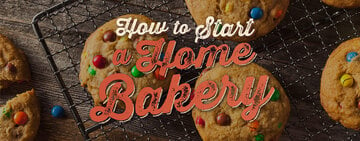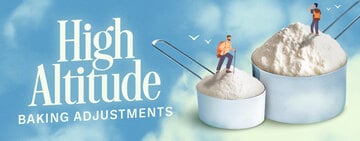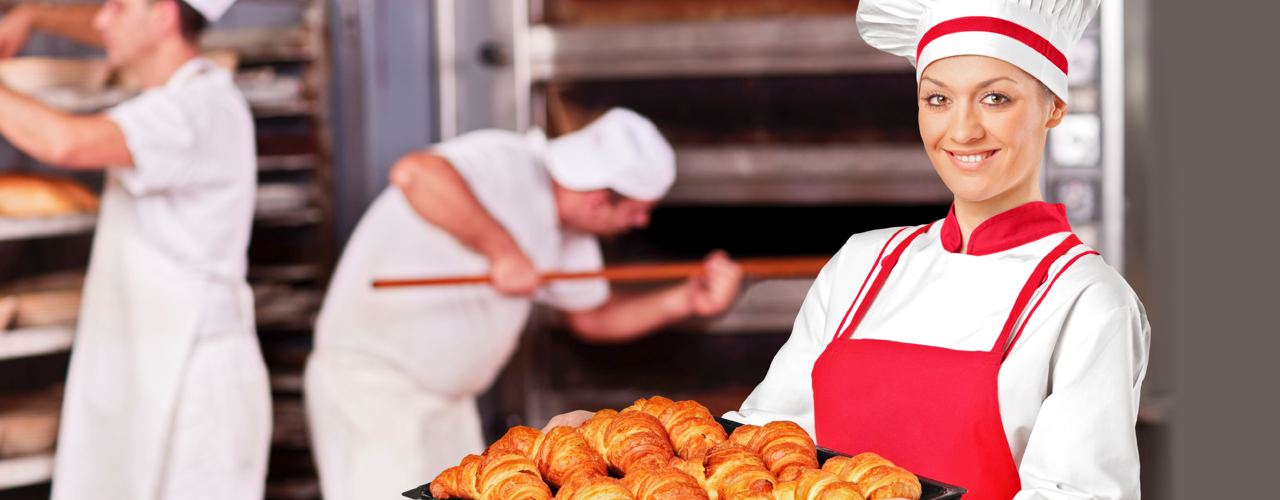
Choosing the Best Commercial Bakery Equipment
Last updated on 6/2/2018Finding the right mix of bakery equipment to outfit your new bakery can seem like a daunting task. It's important to think about not only what you wish to produce, but how much, as those details will influence the specific pieces of equipment you should purchase. Whether you're looking to open a new business, expand your existing one, or simply replace some obsolete or aging pieces, you’ll want to purchase the right equipment and get the most for your money. Below, we’ve provided a list of tips and suggestions to help you get the best bakery equipment for your needs! Plus, we've even included a downloadable checklist for essential smallwares to use in your bakery.
Download Checklist PDFDough Preparation
The first step in making bread or any other baked good is preparing the dough. Having that dough mixed properly is crucial to the quality and texture of the finished product. While a very small or artisan-style operation may prefer to mix their bread dough by hand on a wood-topped baker's table, most commercial bakeries will want at least one, if not multiple dough mixers.
Commercial Mixer
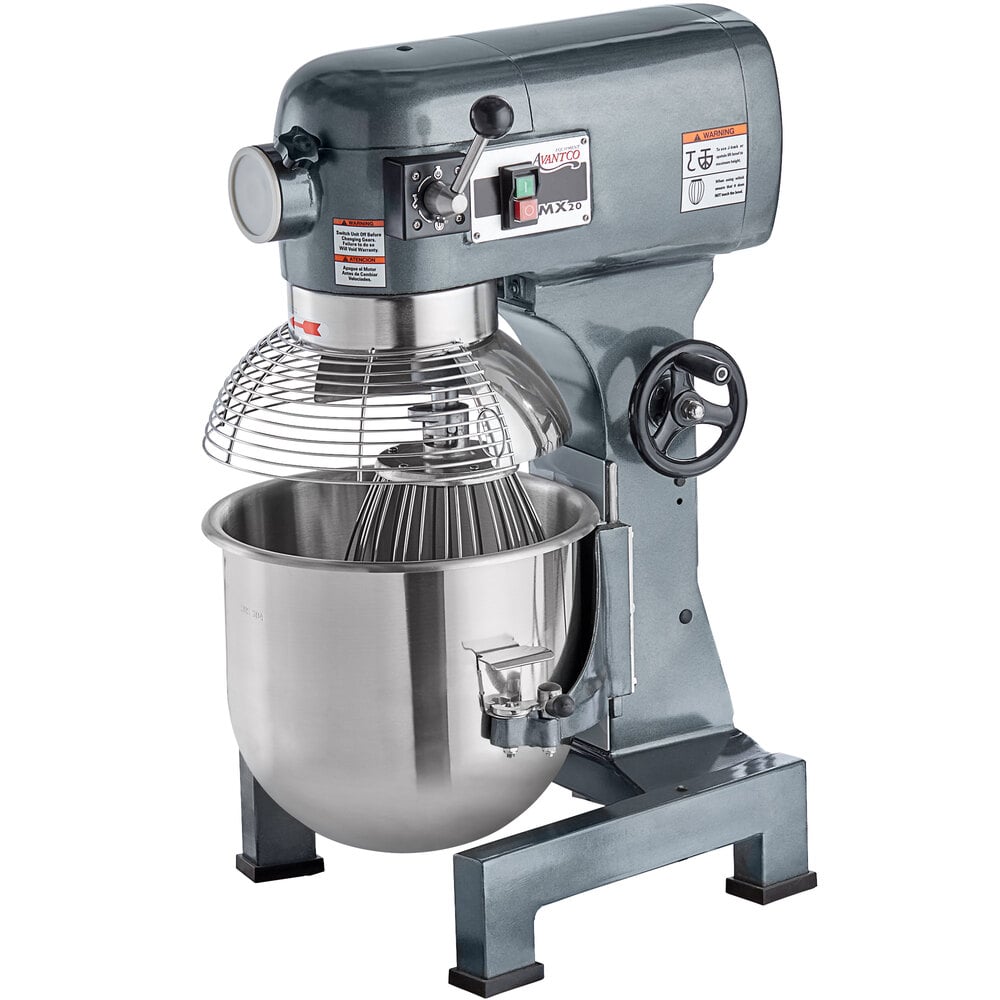
Commercial planetary mixers are available in a dizzying array of sizes, from small 5 qt. countertop models up to 100+ qt. floor units. Most mid to large-size bakeries will have several large floor units and might benefit from a countertop unit's portable nature, which will lend itself to mixing up small batches of icing or fillings quickly and easily. Our commercial mixer guide is a great resource with more detail about mixers, including a handy sizing chart. The most important factor is matching the capabilities of the mixer to what you want to be able to do with it.
Dough Dividers and Sheeters
Dough dividers are specialized pieces of commercial bakery equipment that take a large batch of dough and portion it out into equally sized and weighted balls of dough for consistent results when making pies, bread, or even pizza crusts. Dough sheeters take a ball of dough and roll and stretch it out to the size and thickness that you specified. This improves consistency in your pie and pizza dough crusts.
Dough dividers and dough sheeters are great labor savers and help you improve the consistency of your output. However, you'll want to consider the return on investment, as they can be bulky and expensive to purchase initially. As a result, they're most often used by higher volume establishments.
Holding/Proofing
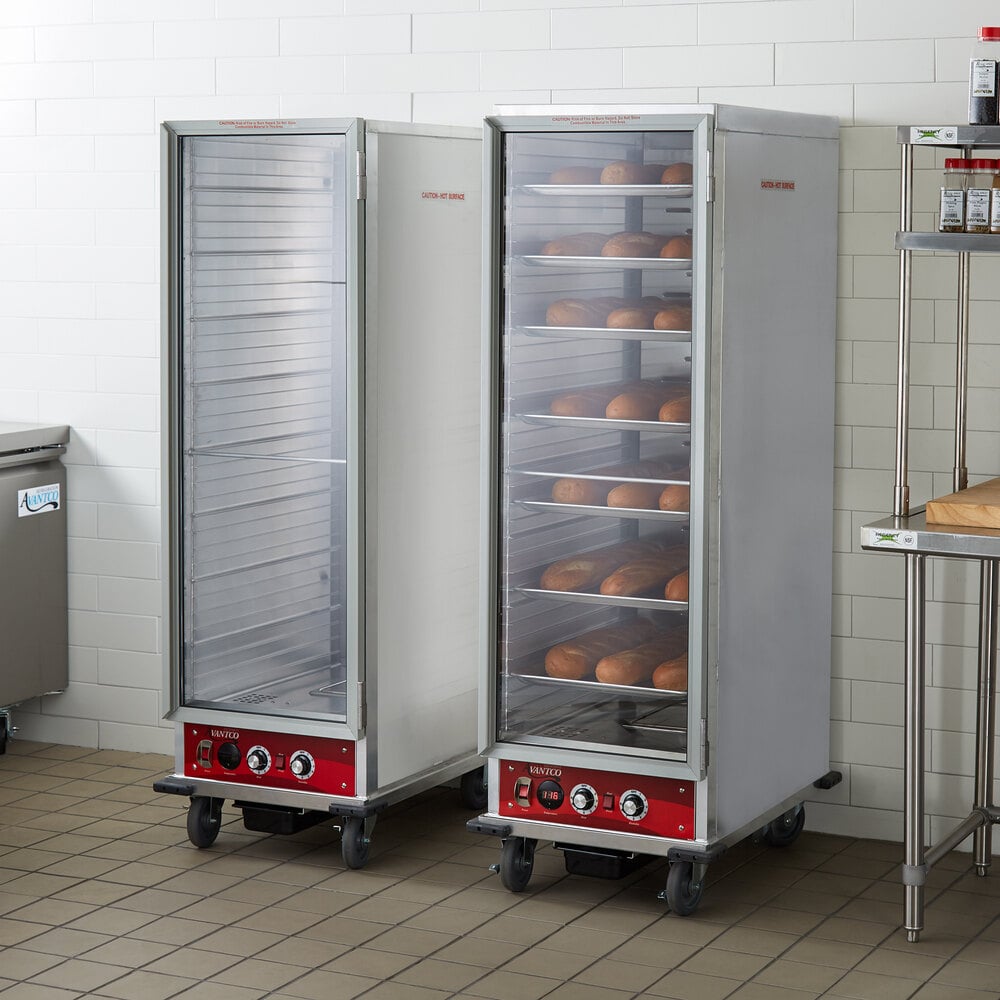
When proofing bread dough, you're allowing it to rise before baking. Because dough rises best in warm, humid environments, you'll likely want to invest in some proofing cabinets. These specialized pieces of equipment achieve the perfect temperature and humidity levels to get consistent, repeatable results. Suffice it to say that the number of variations and styles of proofing cabinets available is huge. Purchasing considerations:
- Size: full height, 3/4 height, 1/2 height, or undercounter
- Door configuration: glass or solid doors, full door or split door
- Interior configurations: Fixed wire slides, lip load slides, shelves, universal slides
You can purchase cabinets that are strictly designed for proofing or models that also boast a hot holding function. These combination holding and proofing cabinets give you the versatility of two different pieces of equipment in a single footprint; you can proof dough and keep the finished product or other foods hot and ready to sell or serve in the same cabinet!
Retarder/Proofer
If you wish to slow down the rising of dough, you can refrigerate it. But, some types of dough turn out best when they're allowed to rest at higher temperatures than those of a commercial refrigerator. In this case, you may want to consider a retarder. The most versatile retarders are combination units that will switch over to proofing the dough when you're ready to do so. These retarder/proofer combos are great labor savers because you can put your dough in them overnight, program the machine to start proofing them at a certain time, and have them proofed and ready for baking exactly when you're ready. A few specialized models even combine the retarder/proofer and convection oven capabilities into one unit!
Baking
The heart of any bakery is its oven, and you'll have a lot of options available to you when deciding what type of oven to purchase. Like purchasing a commercial mixer, it's important to think about what types of product you are producing, and in what quantities, because those factors can influence which type of oven would be best for your needs. Compare the features of commercial ovens before making an investment. In planning, keep in mind that no matter what type of oven you end up installing, you'll almost always need it under a ventilation hood.
Convection Ovens
Convection ovens are one of the most common pieces of commercial bakery equipment. They do a great job of quickly and evenly baking a variety of products, from bread loaves to cookies to cakes, pies, and brownies. Their use of internal fans to circulate the air creates even browning and repeatable results. Of the types of ovens typically used in a bakery, a convection oven is the most common and least expensive.
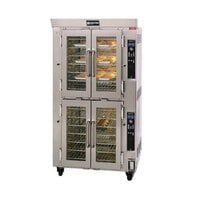
Some high-end bakery convection ovens boast steam injection and other specialized features that can take your baked goods to the next level. For a more thorough breakdown of convection ovens, check out our convection oven guide.
Deck Ovens
Artisan-style bakers or those making specific types of bread often prefer a deck oven. Their stone cooking decks heat up, giving the crust a distinctive, crispy character while maintaining a soft and moist inside. A deck oven takes up a considerably larger amount of space compared to a convection oven, so keep that in mind if space is limited. However, due to their relatively simple design and few moving parts, they last a long time and operate without a lot of hassle. Both single deck and multi-deck styles are available.
Roll-In Rack Ovens
A roll-in rack oven is similar in concept to a roll-in refrigerator or proofing cabinet in that you can wheel a pan rack full of goods right into the oven for baking. Some models will "grab" the pan rack and rotate them during the baking process for even results. The advantage of this style is time and labor savings due to less product handling.
You can save even more time if you have a roll-in proofing cabinet. In that case, you can simply load the pans full of product onto the rack, proof them, roll them into the oven for baking, and roll them out for cooling once you're done baking! If you're considering this style, make sure you have roll-in oven racks designed for this use; not all racks have high-temperature casters.
Revolving Ovens
A revolving oven has large revolving trays that you can load with product, similar in concept to a rotisserie-style oven at a deli or market. These have a very high capacity and output capability but are also quite expensive. Make sure your output needs and budget can justify the purchase of one of these units.
Display and Sales
Bread Slicers
Due to their speed and consistency of cut, bread slicers are a great option if your bakery plans to sell sliced bread. A few specialized models even accommodate unique baked goods such as French bread, buns, and bagels.
Bakery Display Cases
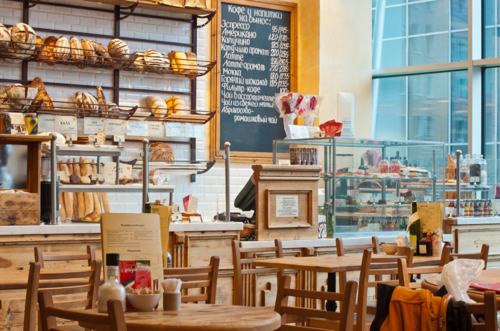
If you have plans for a large retail component in your bakery, you'll want to consider what types of bakery display cases you will need. Both refrigerated and non-refrigerated styles are available, depending on the type of products you plan on selling. Likely, you'll want a mix of both. You will also have to decide whether you want a self-serve display case or one designed for serving customers from behind the counter. As there are so many sizes and styles to consider, it's a good idea to consult our deli case and bakery display case buying guide for a more detailed overview of what's available.
Finding the best commercial bakery equipment is just one step in starting a successful bakery business. In addition to heavy equipment, be sure to stock up on tools like bread knives and other smallwares that are essential for any bakery. We have a wealth of articles and buying guides dedicated to bakery-specific topics!


